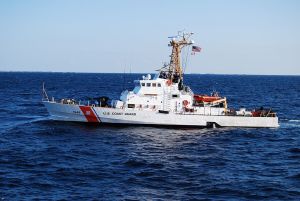 The United States sued Bollinger Shipyards, alleging that it submitted false claims in connection with upgrades on the Coast Guard’s 110-foot patrol ships (right). The gist of the complaint was that “Bollinger eventually submitted the highest of three [strength] calculations (5,232) to the Coast Guard, while employing in its internal documents the middle calculation (3,037).” As to these strength measurements and their review by an independent agency, an internal email said, “adverse results could cause the entire conversion to be an uneconomical solution” and expressed concern that “we BLOW the program.” United States v. Bollinger Shipyards, Inc., No. 13-31301 (Dec. 23, 2014).
The United States sued Bollinger Shipyards, alleging that it submitted false claims in connection with upgrades on the Coast Guard’s 110-foot patrol ships (right). The gist of the complaint was that “Bollinger eventually submitted the highest of three [strength] calculations (5,232) to the Coast Guard, while employing in its internal documents the middle calculation (3,037).” As to these strength measurements and their review by an independent agency, an internal email said, “adverse results could cause the entire conversion to be an uneconomical solution” and expressed concern that “we BLOW the program.” United States v. Bollinger Shipyards, Inc., No. 13-31301 (Dec. 23, 2014).
While the parties disputed the proper interpretation of this evidence, and the district court agreed with the defendants, the Fifth Circuit reversed: “Rule 12(b)(6) does not require the United States to present its best case or even a particularly good case, only to state a plausible case” that Bollinger acted “in reckless disregard of the truthy or falsity” of the measurements. The Court also held: “The government knowledge defense is not appropriate at the motion to dismiss stage, which requires us to draw all inferences in favor of the United States. It is more proper at the summary judgment or trial stage as ‘a means by which the defendant can rebut the government’s assertion of the “knowing” presentation of a false claim.'”





